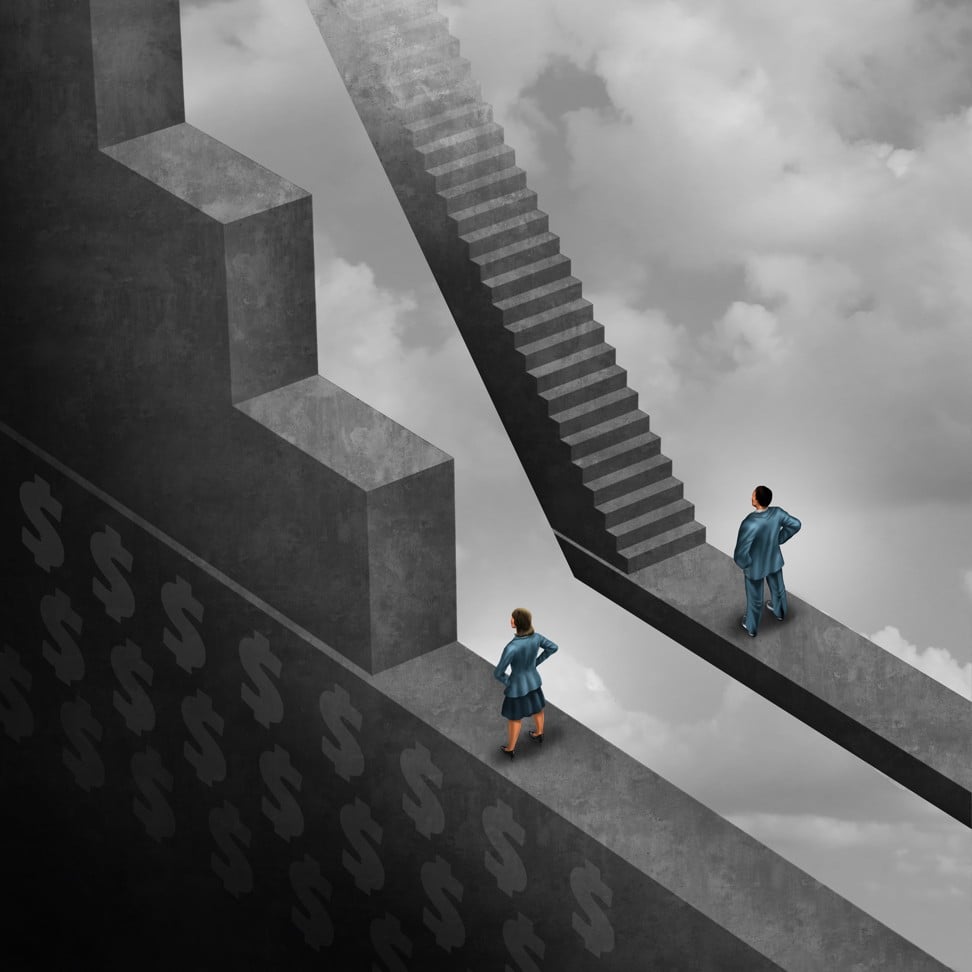
Is gender pay inequality a problem in Hong Kong?
Men and women in the city clearly earn different levels of income, but whether that is something to be fixed is where opinions vary
There was quite a commotion in Hollywood when it was revealed that Michelle Williams was paid less than 1 per cent of what her male co-star received for reshooting scenes of crime thriller All the Money in the World.
On the other side of the Atlantic, public service broadcaster BBC came under fire after its China editor Carrie Gracie resigned over pay inequality disputes.
Hong Kong suffers from the problem of gender pay gap just like anywhere else. Despite being an international finance centre that prides itself on a fair and open business environment, the city still sees its working women earn at least thousands of dollars less than their male counterparts on average, according to government figures.
Hong Kong’s ‘#MeToo’ movement is only just warming up, and we have ways to go
Activists say the problem of pay inequality locally has persisted for years because there are more men at executive and management levels while women are still widely perceived as homemakers. Such societal attitudes have prevented many women from being treated equally at work.
Lawyers say although they have noticed some people working in the same roles being paid less, possibly because of their gender, current legislation on anti-sex discrimination has done little to close the gap. The legislation encourages reconciliation when employees are in a weaker position to confront their bosses.
Such observations come after Iceland recently became the first country in the world to legalise equal pay, making it illegal to pay men and women differently for doing the same work.
The law, which came into effect on January 1, requires companies and government agencies employing at least 25 people to obtain government certification showing they pay everyone in the same roles equally, regardless of gender. Those who fail to get the certification will face fines.
China falls – again – in World Economic Forum’s global ranking for gender equality
When asked whether the Hong Kong government would follow in Iceland’s footsteps, a spokesman for the Labour and Welfare Bureau, which oversees the Women’s Commission, says the bureau doesn’t have a designated team to focus on gender-pay equality issues.
Old-school stereotypes
A 2016 census report showed women working in Hong Kong’s education sector earned HK$9,800 (US$1,250) less than men each month, followed by those in the finance industry where women earned HK$8,800 less than men.
Cultural attitudes still prevent female employees from being treated equally
The third largest pay gap, according to the report, was found in health and social work sector jobs where women were paid HK$8,000 less than men.
“Cultural attitudes still prevent female employees from being treated equally,” the spokesman says. “Women tend to bear more family responsibilities, and they need to take career breaks for babies and take care of young children at home. All these factors may lead to a gender pay gap.”
But Alexa Chow Yee-ping, managing director of AMAC Human Resources Consultants, remains unconvinced that pay inequality exists in the city. Chow thinks it is understandable that women would come back to the workforce in a less privileged position after having taken a career break for various reasons such as giving birth or looking after their families.
“Inequality means you don’t get paid the same even though your contributions are the same as those of your colleagues,” she adds. “If you are not capable, then it is not a matter of inequality.”
Burden of proof
Although the Sex Discrimination Ordinance, which came into force in 1996, prohibits discrimination against either men or women on the basis of sex, marital status and pregnancy in seven public domains including employment, a lack of transparency in some companies’ pay scales has made it extremely difficult for complainants to establish their claims, according to Puja Kapai, an associate professor of law at the University of Hong Kong.
You really need a lot of transparency to be able to confidently say that any difference in pay is purely on the basis of gender
“The legislation itself provides the scope for this kind of claim, but it’s about the practical implementation,” she says. “You really need a lot of transparency to be able to confidently say that any difference in pay is purely on the basis of gender.”
Kapai adds that the legislation’s requirement of attempting reconciliation poses challenges.
“It puts a lot of claimants in a very difficult position because oftentimes they don’t necessarily want to confront their very powerful employers.”
Lawyer Chong Yiu-kwong echoes Kapai’s view, adding: “We have a law in place when it comes to gender equality, but it has loopholes.”
To reduce the gender pay gap, Kapai suggests the government carry out a policy more closely tied to employers’ liabilities, such as requiring them to file data about their pay terms.
Chong, who is also a senior lecturer at the Education University’s department of education policy and leadership, says there should be an ordinance tailor-made for gender pay equality. But he is sceptical about the effectiveness of criminalising unequal pay based on gender as Iceland now does, mainly because of the city’s different legal setting and culture.
Two-thirds of the UK’s gender pay gap cannot be explained, says statistics body
He observes there has been relatively little debate locally on gender pay equality because the issue is “not obvious” in daily life. And the lack of awareness makes it hard to recognise there is a problem.
“Lots of people in Hong Kong think they are already living in a pretty advanced, open and fair society,” Chong says. “They think it’s already good enough to see more and more women joining the workforce.
“We don’t have that kind of awareness to recognise there’s a problem when women are paid less than men.”
From January to November last year, the EOC received 168 complaints, mostly relating to sexual harassment and pregnancy discrimination, and none were on the grounds of gender pay inequality.
TEACHING POINT
Name: Dennis Tse
Occupation: Teacher
Age: 30
Working experience: Five years of teaching experience
Monthly salary: HK$36,000
Are you aware of any gender pay gap problem at your workplace?
I teach in a government-subsidised secondary school, which follows the government’s pay scale system. So teachers in the same role should be paid the same regardless of their gender, unless seniority and working experience are considered. But most people in my school’s senior management are male.
What are your thoughts on gender inequality in the workplace?
I don’t think the problem of gender inequality is very serious in the education sector. I think as long as you are dedicated to your job, employers will not refuse to promote you just because of your gender. I am not sexist, but I guess maybe because women need to take care of their families most of the time, their work performance may turn out to be not as good as that of their male colleagues, therefore, fewer women end up in senior positions.
How do you feel when seeing more male senior managers at your workplace?
I don’t think this is extraordinary. Isn’t it the norm in society? We are living in a Chinese society. And in the past, Chinese people favoured men. So, I don’t think it’s a problem. I think seats will always be reserved for the capable.
Name: Ms Li (prefers only to be known by her surname)
Occupation: Teacher
Age: 28
Working experience: Five years of non-teaching work experience
Monthly salary: HK$25,000
Are you aware of any gender pay gap problem at your workplace?
At the government-subsidised primary school where I teach, employers must follow the Education Bureau’s pay scale system. In general, I don’t think that the gender pay gap is a problematic issue in Hong Kong. I believe that salaries are related to the industries themselves, and for teachers, we are paid based on our experience. So if you’re superior then you’ll have bigger pay check, which is only reasonable.
What are your thoughts on gender inequality in the workplace?
As I said, I don’t share this thought that there is a gender pay gap regarding my situation. However, if the situation exists, then I think the government needs to enact legislation to better protect the female workforce. Not just for women, I think that for men as well, everyone should be assured that their worth is not overlooked just because of their gender. There is a need to push the concept that pay is based on ability and nothing else.
Are there more male senior managers than female ones at your workplace?
At my school, I find a fair amount of men and women holding management posts on campus. With that said, I don’t think having more male senior managers is unfair, in terms of manpower. I cannot further comment on this.
TOP 10 INDUSTRIES WITH THE LARGEST GENDER PAY GAP
Sector Male Female Pay gap
Education 29,800 20,000 9,800
Finance 33,800 25,000 8,800
Human health and social work 24,000 16,000 8,000
Import/export 22,000 15,500 6,500
Manufacturing (excluding
textiles & apparel) 17,000 11,000 6,000
Professional & business services 18,000 12,600 5,400
Insurance 25,000 20,000 5,000
Accommodation & food services 15,000 10,500 4,500
Art, entertainment & recreation 16,000 12,000 4,000
Retail 14,900 11,000 3,900
TOP FIVE INDUSTRIES WITH THE SMALLEST PAY GAP
Sector Male Female Pay gap
Transport & storage 15,000 15,000 0
Construction (decoration, repair
& maintenance for buildings) 15,100 14,000 1,100
Postal & courier 14,000 12,000 2,000
Public administration 30,000 28,000 2,000
Information & communications 22,100 20,000 2,100
Source: Women and Men in Hong Kong Key Statistics, 2017 Edition, Census and Statistics Department


